Презентация nordic self expression 2013


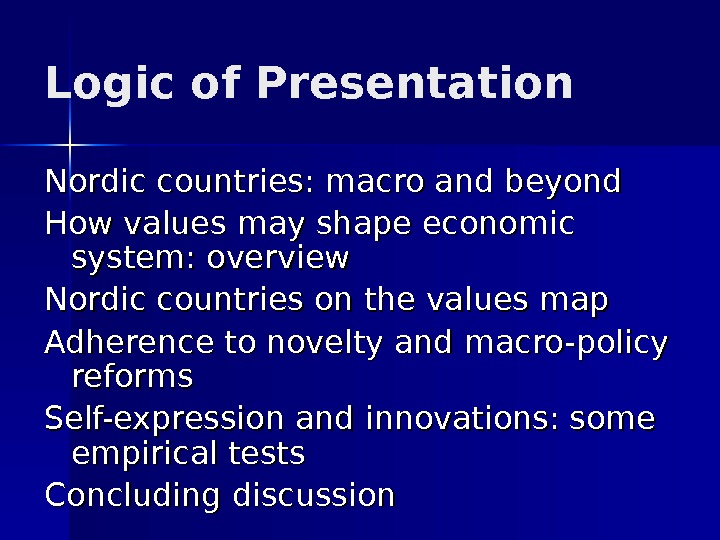
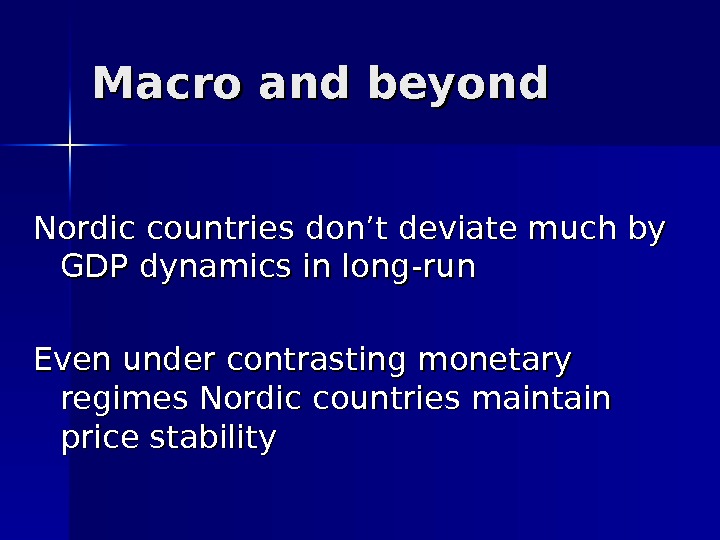
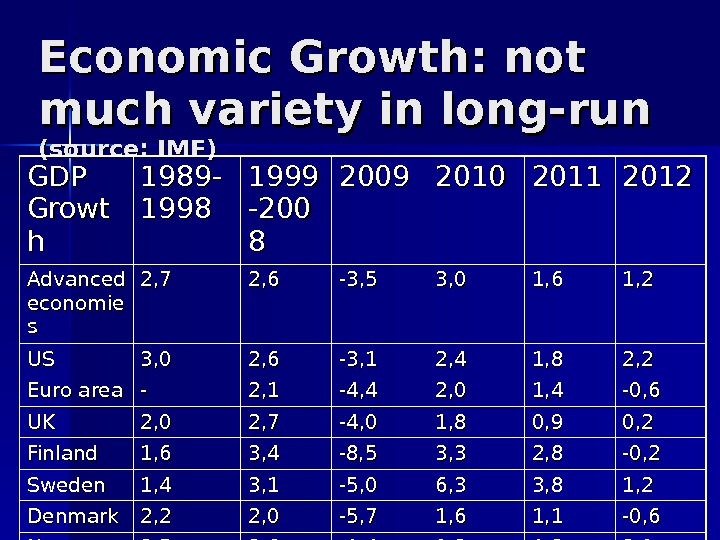
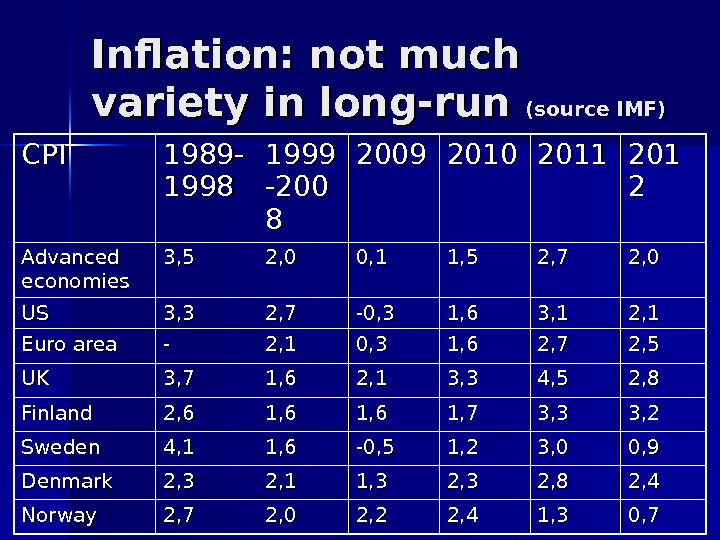
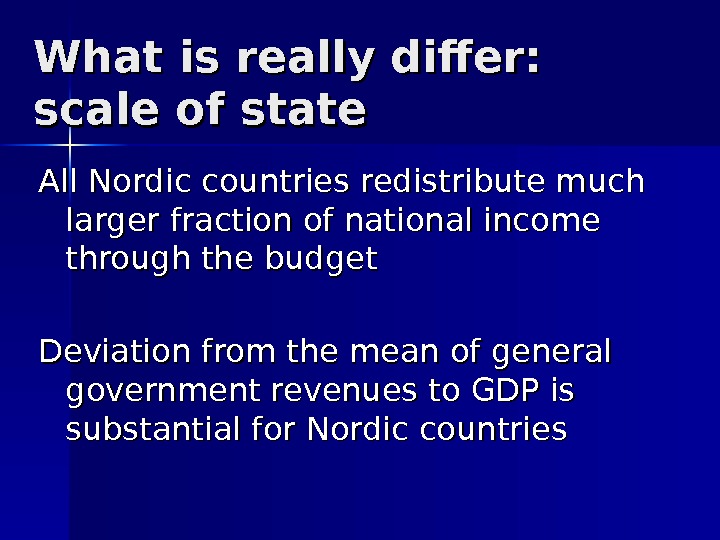
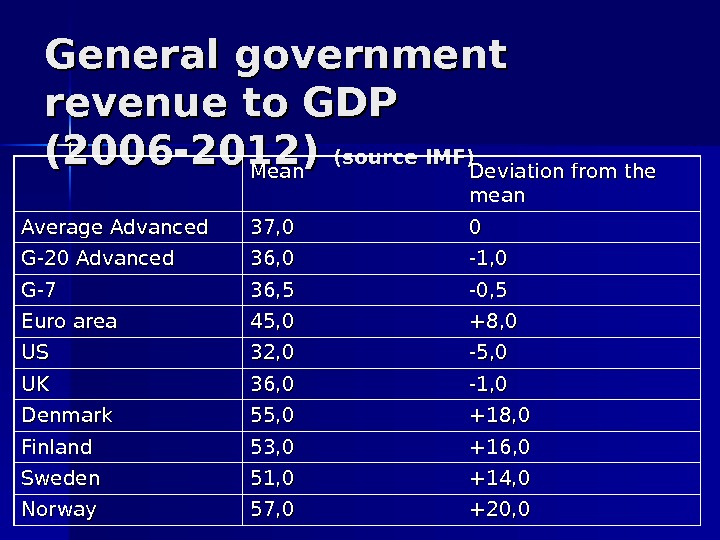
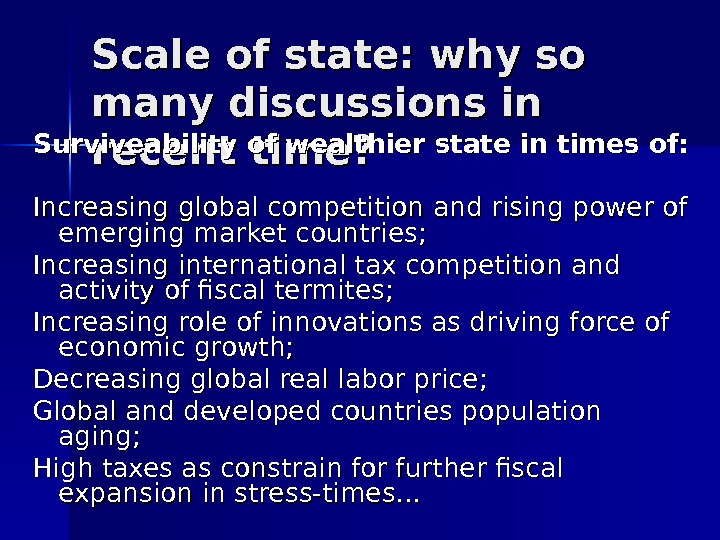
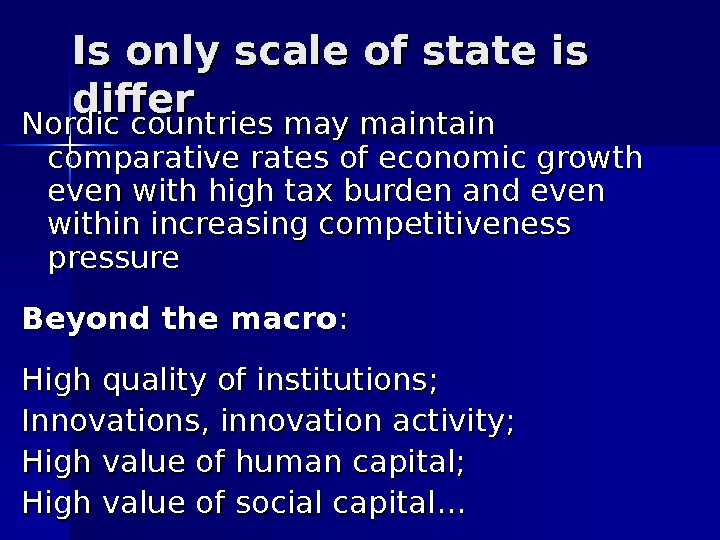
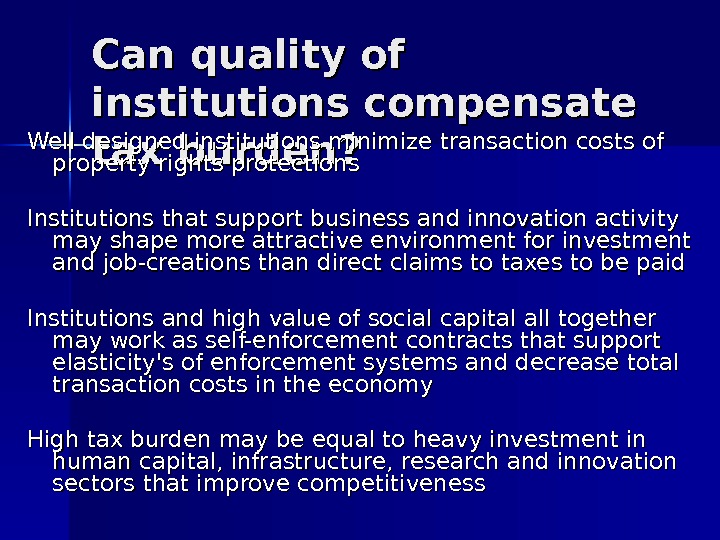
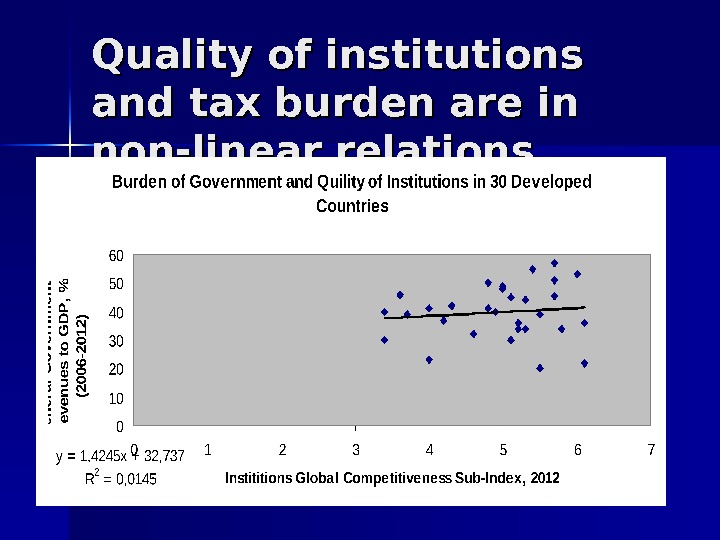
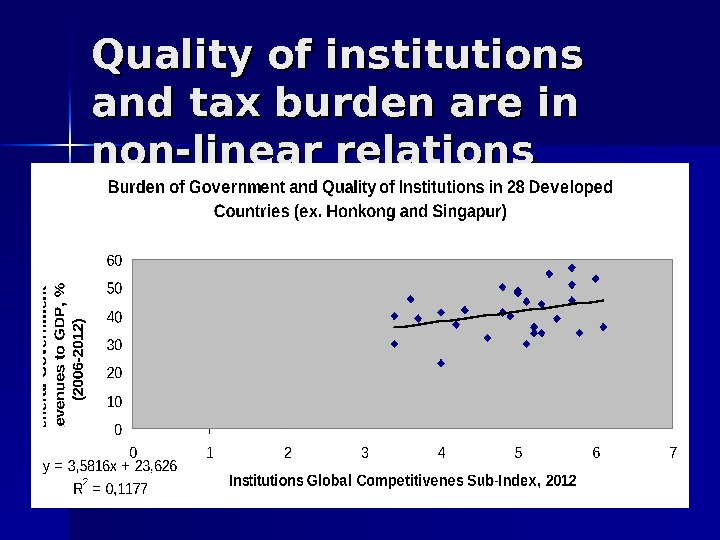
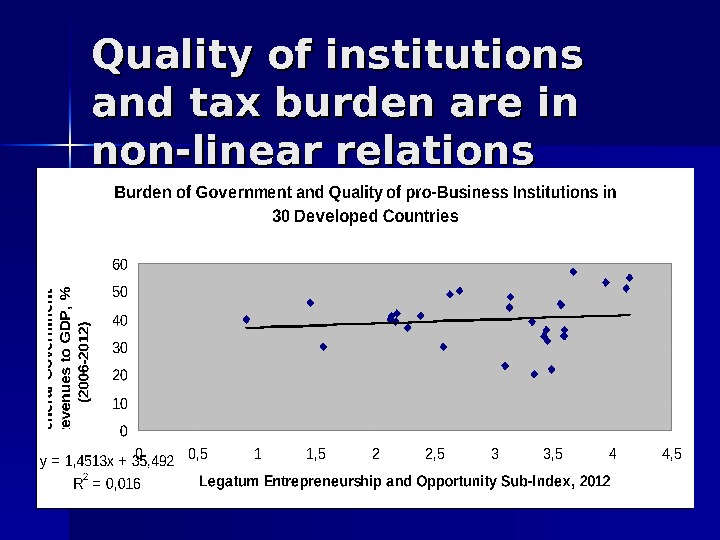
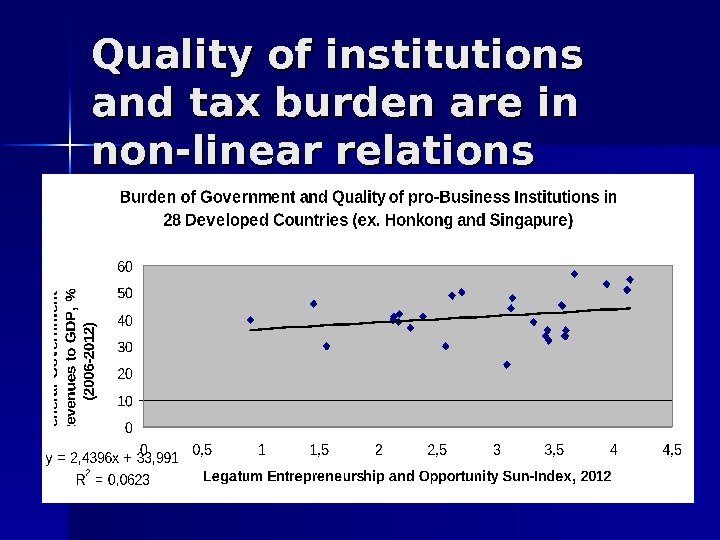
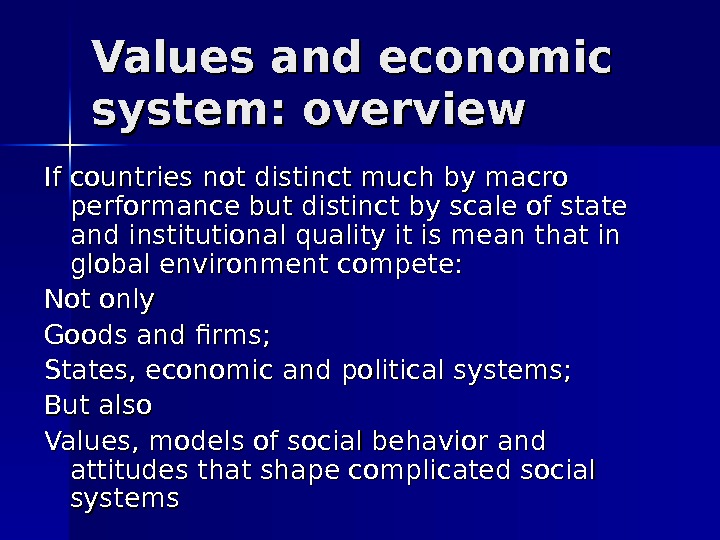
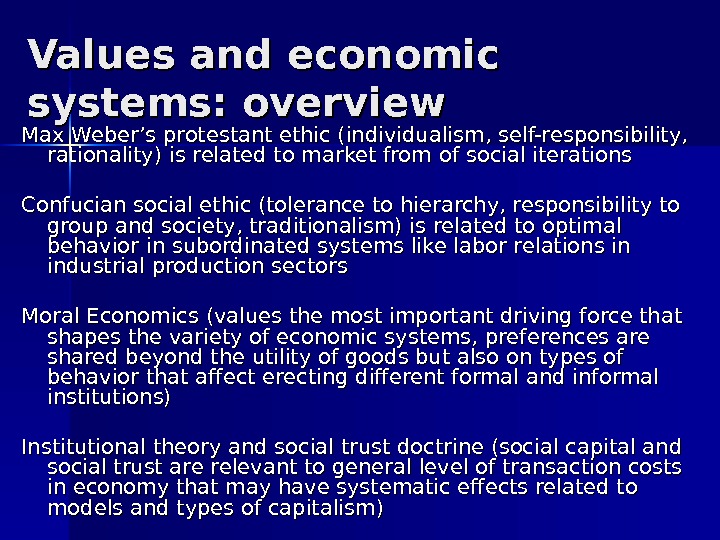
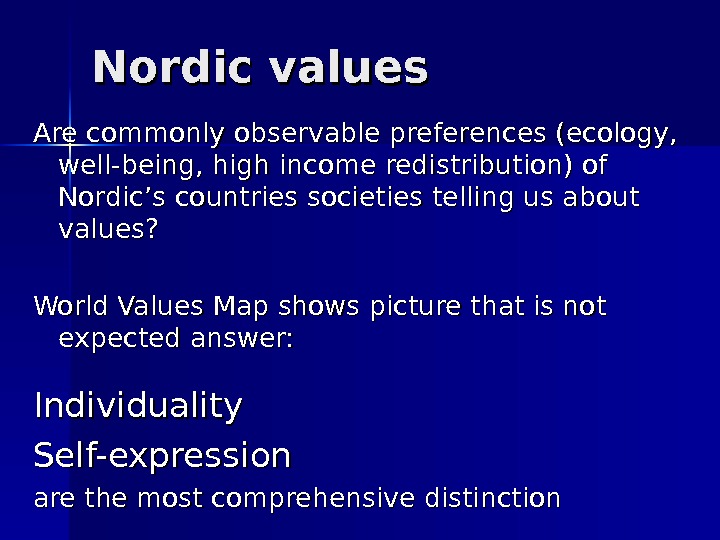
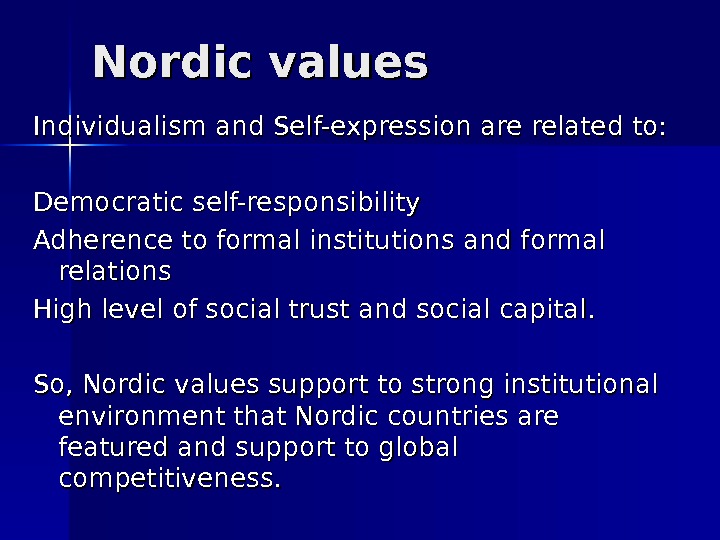
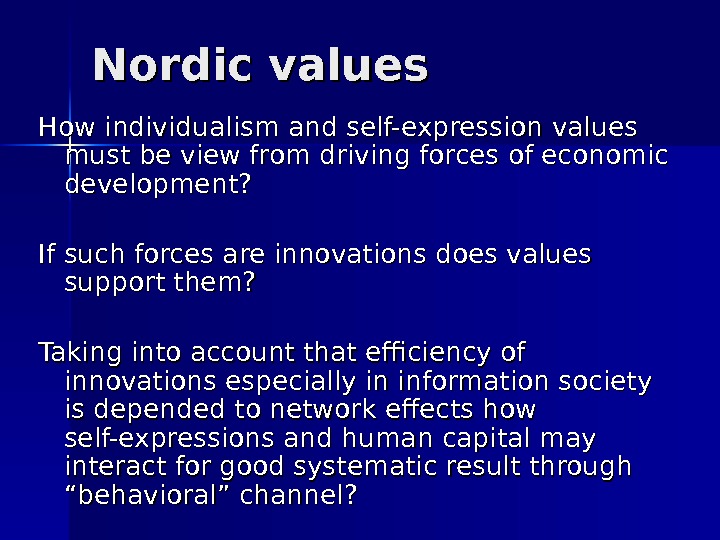
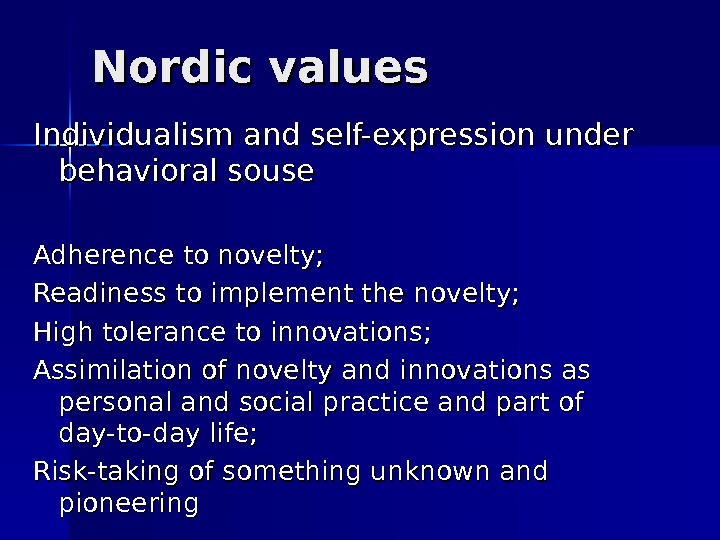
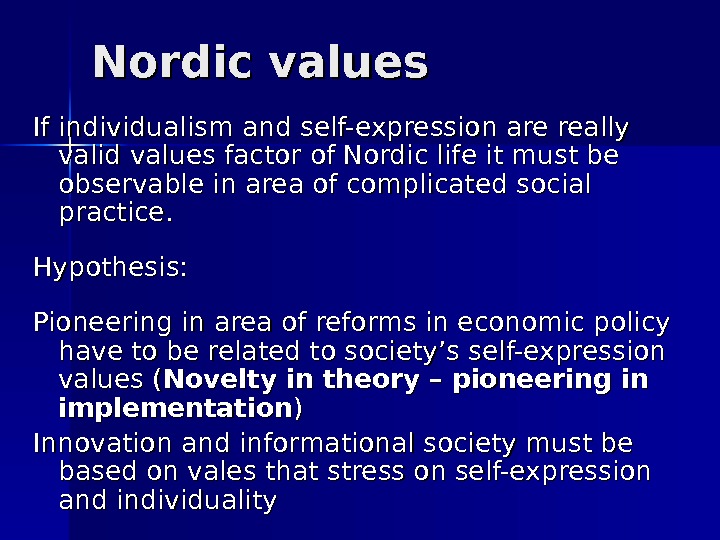
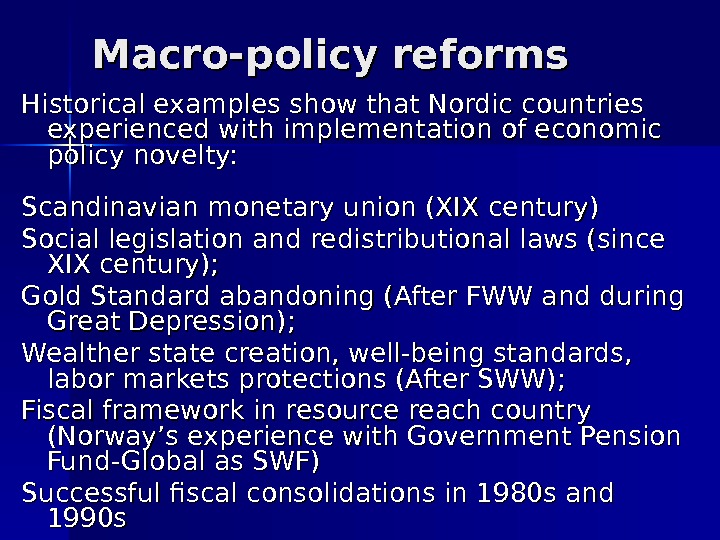
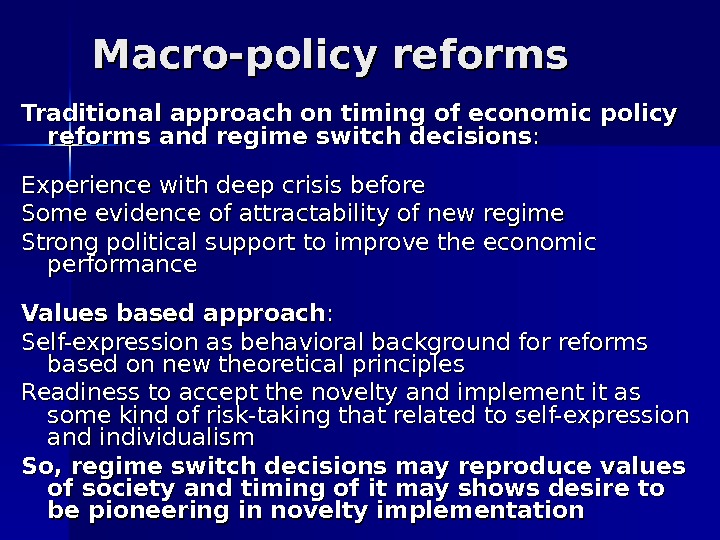
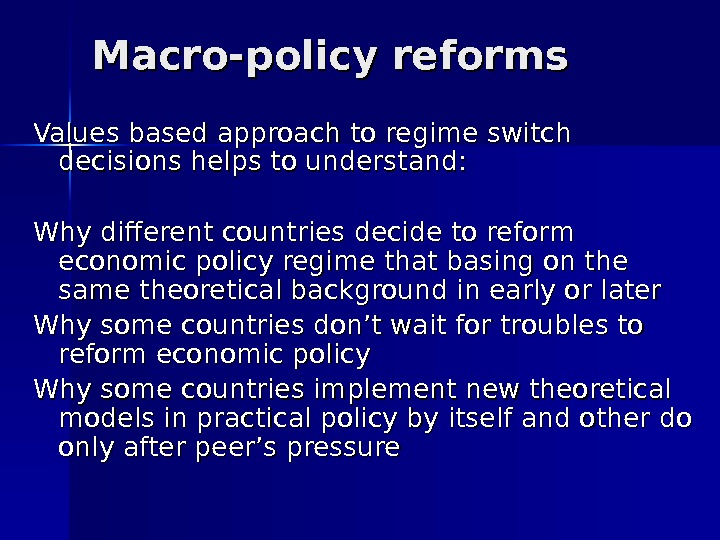
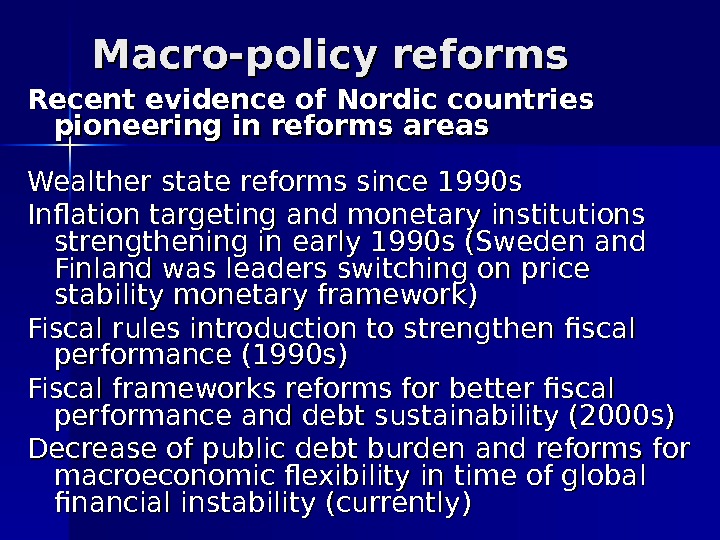
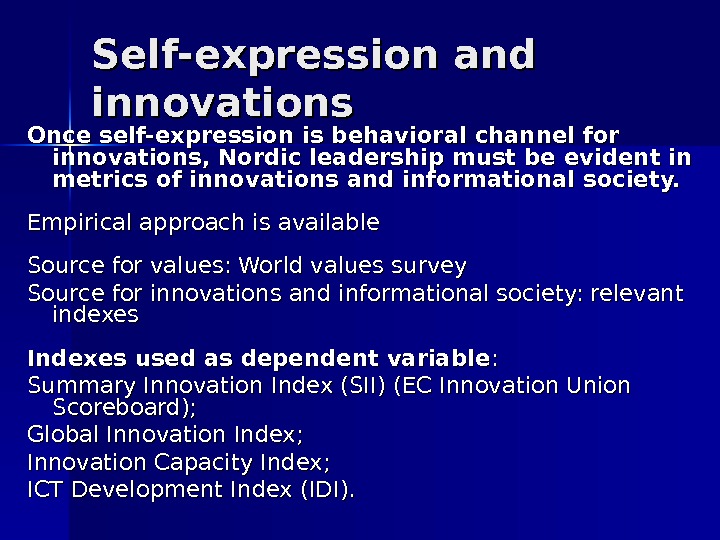
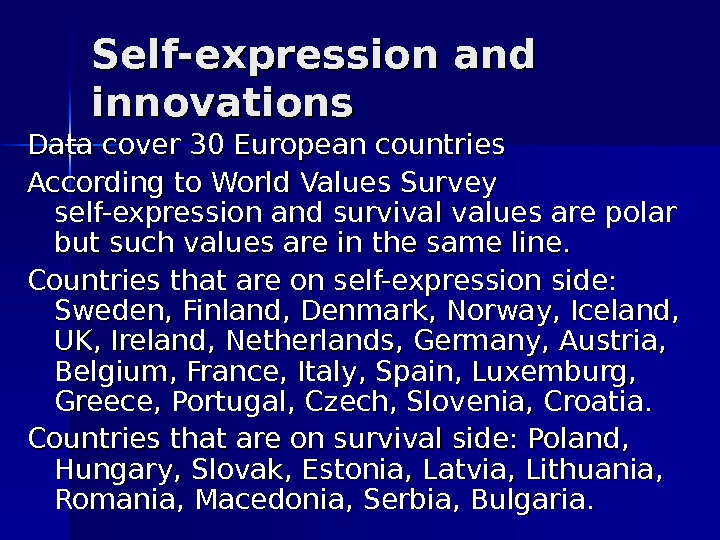
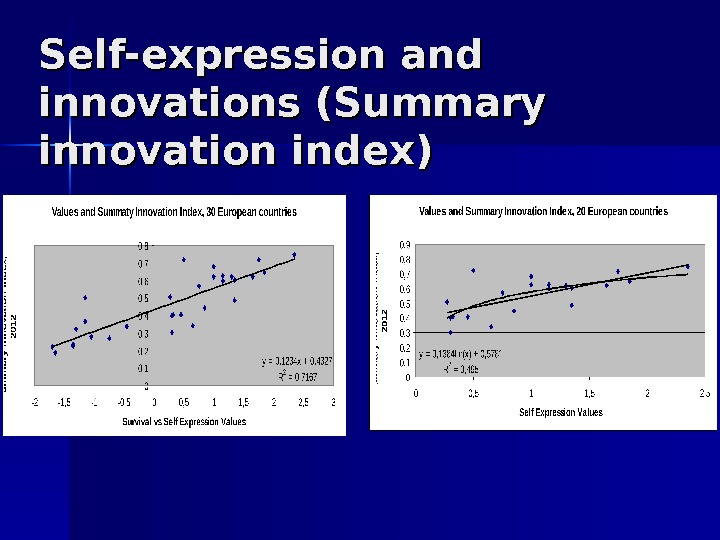
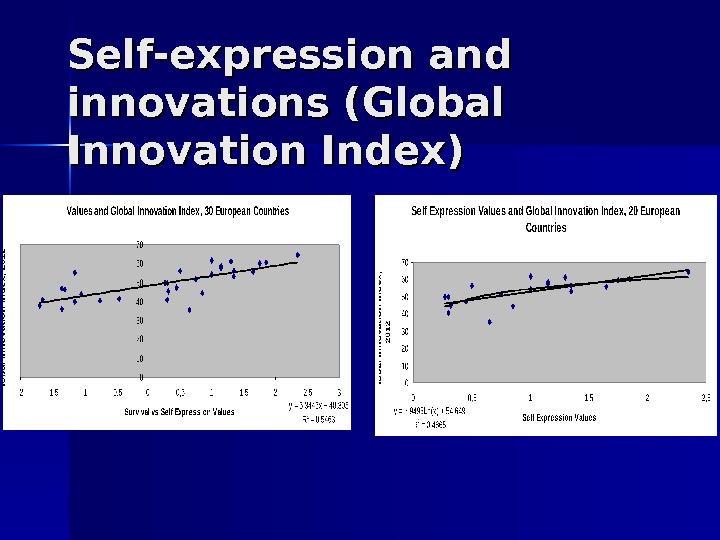
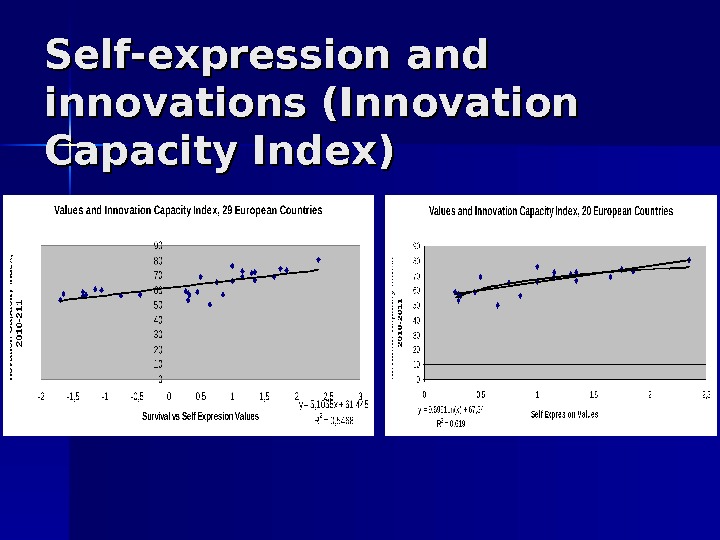
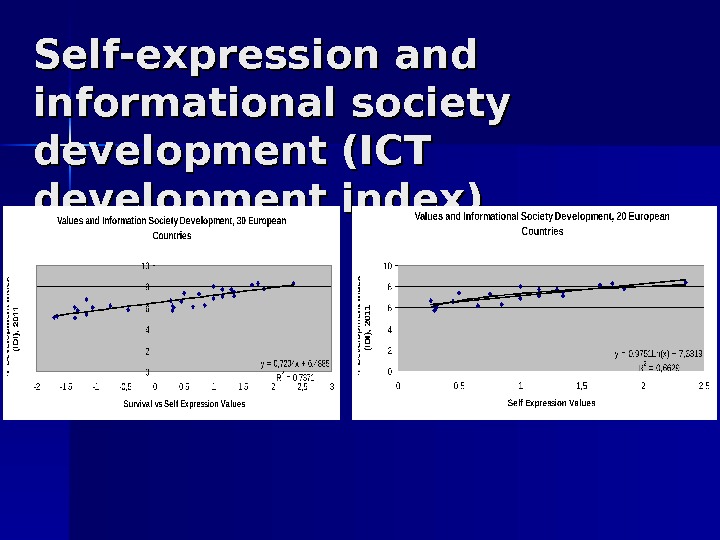
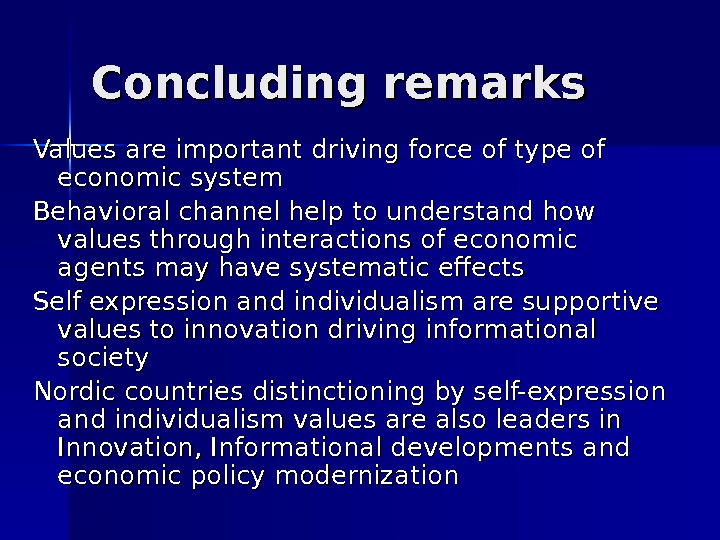
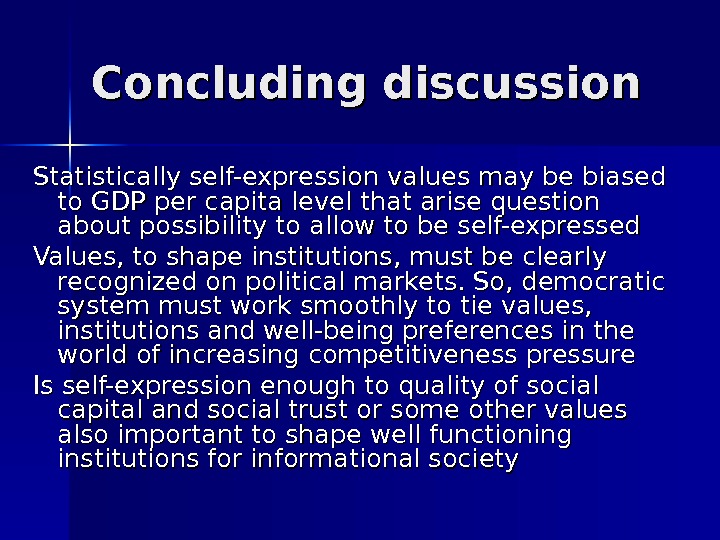
- Размер: 349 Кб
- Количество слайдов: 33
Описание презентации Презентация nordic self expression 2013 по слайдам
 NORDIC INDIVIDUALITY, SELF-EXPRESSION AND READINESS TO IMPLEMENT THE NOVELTY: FROM MACRO-POLICY REFORMS TO NEW INFORMATIONAL SOCIETY Professor Victor Kozyuk Ternopil National Economic University Ukraine
NORDIC INDIVIDUALITY, SELF-EXPRESSION AND READINESS TO IMPLEMENT THE NOVELTY: FROM MACRO-POLICY REFORMS TO NEW INFORMATIONAL SOCIETY Professor Victor Kozyuk Ternopil National Economic University Ukraine
 Logic of Presentation Nordic countries: macro and beyond How values may shape economic system: overview Nordic countries on the values map Adherence to novelty and macro-policy reforms Self-expression and innovations: some empirical tests Concluding discussion
Logic of Presentation Nordic countries: macro and beyond How values may shape economic system: overview Nordic countries on the values map Adherence to novelty and macro-policy reforms Self-expression and innovations: some empirical tests Concluding discussion
 Macro and beyond Nordic countries don’t deviate much by GDP dynamics in long-run Even under contrasting monetary regimes Nordic countries maintain price stability
Macro and beyond Nordic countries don’t deviate much by GDP dynamics in long-run Even under contrasting monetary regimes Nordic countries maintain price stability
 Economic Growth: not much variety in long-run (source: IMF) GDP Growt hh 1989 — 1998 1999 -200 88 2009 2010 2011 2012 Advanced economie ss 2, 7 2, 6 -3, 5 3, 0 1, 6 1, 2 USUS 3, 0 2, 6 -3, 1 2, 4 1, 8 2, 2 Euro area — 2, 1 -4, 4 2, 0 1, 4 -0, 6 UKUK 2, 0 2, 7 -4, 0 1, 8 0, 9 0, 2 Finland 1, 6 3, 4 -8, 5 3, 3 2, 8 -0, 2 Sweden 1, 4 3, 1 -5, 0 6, 3 3, 8 1, 2 Denmark 2, 2 2, 0 -5, 7 1, 6 1, 1 -0, 6 Norway 3, 5 2, 6 -1, 4 0, 2 1, 3 3,
Economic Growth: not much variety in long-run (source: IMF) GDP Growt hh 1989 — 1998 1999 -200 88 2009 2010 2011 2012 Advanced economie ss 2, 7 2, 6 -3, 5 3, 0 1, 6 1, 2 USUS 3, 0 2, 6 -3, 1 2, 4 1, 8 2, 2 Euro area — 2, 1 -4, 4 2, 0 1, 4 -0, 6 UKUK 2, 0 2, 7 -4, 0 1, 8 0, 9 0, 2 Finland 1, 6 3, 4 -8, 5 3, 3 2, 8 -0, 2 Sweden 1, 4 3, 1 -5, 0 6, 3 3, 8 1, 2 Denmark 2, 2 2, 0 -5, 7 1, 6 1, 1 -0, 6 Norway 3, 5 2, 6 -1, 4 0, 2 1, 3 3,
 Inflation: not much variety in long-run (source IMF) CPICPI 1989 — 1998 1999 -200 88 2009 2010 2011 201201 22 Advanced economies 3, 5 2, 0 0, 1 1, 5 2, 7 2, 0 USUS 3, 3 2, 7 -0, 3 1, 6 3, 1 2, 1 Euro area — 2, 1 0, 3 1, 6 2, 7 2, 5 UKUK 3, 7 1, 6 2, 1 3, 3 4, 5 2, 8 Finland 2, 6 1, 61, 6 1, 7 3, 3 3, 2 Sweden 4, 1 1, 6 -0, 5 1, 2 3, 0 0, 9 Denmark 2, 3 2, 1 1, 3 2, 8 2, 4 Norway 2, 7 2, 0 2, 2 2, 4 1, 3 0,
Inflation: not much variety in long-run (source IMF) CPICPI 1989 — 1998 1999 -200 88 2009 2010 2011 201201 22 Advanced economies 3, 5 2, 0 0, 1 1, 5 2, 7 2, 0 USUS 3, 3 2, 7 -0, 3 1, 6 3, 1 2, 1 Euro area — 2, 1 0, 3 1, 6 2, 7 2, 5 UKUK 3, 7 1, 6 2, 1 3, 3 4, 5 2, 8 Finland 2, 6 1, 61, 6 1, 7 3, 3 3, 2 Sweden 4, 1 1, 6 -0, 5 1, 2 3, 0 0, 9 Denmark 2, 3 2, 1 1, 3 2, 8 2, 4 Norway 2, 7 2, 0 2, 2 2, 4 1, 3 0,
 What is really differ: scale of state All Nordic countries redistribute much larger fraction of national income through the budget Deviation from the mean of general government revenues to GDP is substantial for Nordic countries
What is really differ: scale of state All Nordic countries redistribute much larger fraction of national income through the budget Deviation from the mean of general government revenues to GDP is substantial for Nordic countries
 General government revenue to GDP (2006 -2012) (source IMF) Mean Deviation from the mean Average Advanced 37, 0 00 G-20 Advanced 36, 0 -1, 0 G-7 G-7 36, 5 -0, 5 Euro area 45, 0 +8, 0 USUS 32, 0 -5, 0 UKUK 36, 0 -1, 0 Denmark 55, 0 +18, 0 Finland 53, 0 +16, 0 Sweden 51, 0 +14, 0 Norway 57, 0 +20,
General government revenue to GDP (2006 -2012) (source IMF) Mean Deviation from the mean Average Advanced 37, 0 00 G-20 Advanced 36, 0 -1, 0 G-7 G-7 36, 5 -0, 5 Euro area 45, 0 +8, 0 USUS 32, 0 -5, 0 UKUK 36, 0 -1, 0 Denmark 55, 0 +18, 0 Finland 53, 0 +16, 0 Sweden 51, 0 +14, 0 Norway 57, 0 +20,
 Scale of state: why so many discussions in recent time? Surviveability of wealthier state in times of: Increasing global competition and rising power of emerging market countries; Increasing international tax competition and activity of fiscal termites; Increasing role of innovations as driving force of economic growth; Decreasing global real labor price; Global and developed countries population aging; High taxes as constrain for further fiscal expansion in stress-times…
Scale of state: why so many discussions in recent time? Surviveability of wealthier state in times of: Increasing global competition and rising power of emerging market countries; Increasing international tax competition and activity of fiscal termites; Increasing role of innovations as driving force of economic growth; Decreasing global real labor price; Global and developed countries population aging; High taxes as constrain for further fiscal expansion in stress-times…
 Is only scale of state is differ Nordic countries may maintain comparative rates of economic growth even with high tax burden and even within increasing competitiveness pressure Beyond the macro : : High quality of institutions; Innovations, innovation activity; High value of human capital; High value of social capital…
Is only scale of state is differ Nordic countries may maintain comparative rates of economic growth even with high tax burden and even within increasing competitiveness pressure Beyond the macro : : High quality of institutions; Innovations, innovation activity; High value of human capital; High value of social capital…
 Can quality of institutions compensate tax burden? Well designed institutions minimize transaction costs of property rights protections Institutions that support business and innovation activity may shape more attractive environment for investment and job-creations than direct claims to taxes to be paid Institutions and high value of social capital all together may work as self-enforcement contracts that support elasticity’s of enforcement systems and decrease total transaction costs in the economy High tax burden may be equal to heavy investment in human capital, infrastructure, research and innovation sectors that improve competitiveness
Can quality of institutions compensate tax burden? Well designed institutions minimize transaction costs of property rights protections Institutions that support business and innovation activity may shape more attractive environment for investment and job-creations than direct claims to taxes to be paid Institutions and high value of social capital all together may work as self-enforcement contracts that support elasticity’s of enforcement systems and decrease total transaction costs in the economy High tax burden may be equal to heavy investment in human capital, infrastructure, research and innovation sectors that improve competitiveness
 Quality of institutions and tax burden are in non-linear relations
Quality of institutions and tax burden are in non-linear relations
 Quality of institutions and tax burden are in non-linear relations
Quality of institutions and tax burden are in non-linear relations
 Quality of institutions and tax burden are in non-linear relations
Quality of institutions and tax burden are in non-linear relations
 Quality of institutions and tax burden are in non-linear relations
Quality of institutions and tax burden are in non-linear relations
 Values and economic system: overview If countries not distinct much by macro performance but distinct by scale of state and institutional quality it is mean that in global environment compete: Not only Goods and firms; States, economic and political systems; But also Values, models of social behavior and attitudes that shape complicated social systems
Values and economic system: overview If countries not distinct much by macro performance but distinct by scale of state and institutional quality it is mean that in global environment compete: Not only Goods and firms; States, economic and political systems; But also Values, models of social behavior and attitudes that shape complicated social systems
 Values and economic systems: overview Max Weber’s protestant ethic (individualism, self-responsibility, rationality) is related to market from of social iterations Confucian social ethic (tolerance to hierarchy, responsibility to group and society, traditionalism) is related to optimal behavior in subordinated systems like labor relations in industrial production sectors Moral Economics (values the most important driving force that shapes the variety of economic systems, preferences are shared beyond the utility of goods but also on types of behavior that affect erecting different formal and informal institutions) Institutional theory and social trust doctrine (social capital and social trust are relevant to general level of transaction costs in economy that may have systematic effects related to models and types of capitalism)
Values and economic systems: overview Max Weber’s protestant ethic (individualism, self-responsibility, rationality) is related to market from of social iterations Confucian social ethic (tolerance to hierarchy, responsibility to group and society, traditionalism) is related to optimal behavior in subordinated systems like labor relations in industrial production sectors Moral Economics (values the most important driving force that shapes the variety of economic systems, preferences are shared beyond the utility of goods but also on types of behavior that affect erecting different formal and informal institutions) Institutional theory and social trust doctrine (social capital and social trust are relevant to general level of transaction costs in economy that may have systematic effects related to models and types of capitalism)
 Nordic values Are commonly observable preferences (ecology, well-being, high income redistribution) of Nordic’s countries societies telling us about values? World Values Map shows picture that is not expected answer: Individuality Self-expression are the most comprehensive distinction
Nordic values Are commonly observable preferences (ecology, well-being, high income redistribution) of Nordic’s countries societies telling us about values? World Values Map shows picture that is not expected answer: Individuality Self-expression are the most comprehensive distinction
 Nordic values Individualism and Self-expression are related to: Democratic self-responsibility Adherence to formal institutions and formal relations High level of social trust and social capital. So, Nordic values support to strong institutional environment that Nordic countries are featured and support to global competitiveness.
Nordic values Individualism and Self-expression are related to: Democratic self-responsibility Adherence to formal institutions and formal relations High level of social trust and social capital. So, Nordic values support to strong institutional environment that Nordic countries are featured and support to global competitiveness.
 Nordic values How individualism and self-expression values must be view from driving forces of economic development? If such forces are innovations does values support them? Taking into account that efficiency of innovations especially in information society is depended to network effects how self-expressions and human capital may interact for good systematic result through “behavioral” channel?
Nordic values How individualism and self-expression values must be view from driving forces of economic development? If such forces are innovations does values support them? Taking into account that efficiency of innovations especially in information society is depended to network effects how self-expressions and human capital may interact for good systematic result through “behavioral” channel?
 Nordic values Individualism and self-expression under behavioral souse Adherence to novelty; Readiness to implement the novelty; High tolerance to innovations; Assimilation of novelty and innovations as personal and social practice and part of day-to-day life; Risk-taking of something unknown and pioneering
Nordic values Individualism and self-expression under behavioral souse Adherence to novelty; Readiness to implement the novelty; High tolerance to innovations; Assimilation of novelty and innovations as personal and social practice and part of day-to-day life; Risk-taking of something unknown and pioneering
 Nordic values If individualism and self-expression are really valid values factor of Nordic life it must be observable in area of complicated social practice. Hypothesis: Pioneering in area of reforms in economic policy have to be related to society’s self-expression values ( Novelty in theory – pioneering in implementation )) Innovation and informational society must be based on vales that stress on self-expression and individuality
Nordic values If individualism and self-expression are really valid values factor of Nordic life it must be observable in area of complicated social practice. Hypothesis: Pioneering in area of reforms in economic policy have to be related to society’s self-expression values ( Novelty in theory – pioneering in implementation )) Innovation and informational society must be based on vales that stress on self-expression and individuality
 Macro-policy reforms Historical examples show that Nordic countries experienced with implementation of economic policy novelty: Scandinavian monetary union (XIX century) Social legislation and redistributional laws (since XIX century); Gold Standard abandoning (After FWW and during Great Depression); Wealther state creation, well-being standards, labor markets protections (After SWW); Fiscal framework in resource reach country (Norway’s experience with Government Pension Fund-Global as SWF) Successful fiscal consolidations in 1980 s and 1990 s
Macro-policy reforms Historical examples show that Nordic countries experienced with implementation of economic policy novelty: Scandinavian monetary union (XIX century) Social legislation and redistributional laws (since XIX century); Gold Standard abandoning (After FWW and during Great Depression); Wealther state creation, well-being standards, labor markets protections (After SWW); Fiscal framework in resource reach country (Norway’s experience with Government Pension Fund-Global as SWF) Successful fiscal consolidations in 1980 s and 1990 s
 Macro-policy reforms Traditional approach on timing of economic policy reforms and regime switch decisions : : Experience with deep crisis before Some evidence of attractability of new regime Strong political support to improve the economic performance Values based approach : : Self-expression as behavioral background for reforms based on new theoretical principles Readiness to accept the novelty and implement it as some kind of risk-taking that related to self-expression and individualism So, regime switch decisions may reproduce values of society and timing of it may shows desire to be pioneering in novelty implementation
Macro-policy reforms Traditional approach on timing of economic policy reforms and regime switch decisions : : Experience with deep crisis before Some evidence of attractability of new regime Strong political support to improve the economic performance Values based approach : : Self-expression as behavioral background for reforms based on new theoretical principles Readiness to accept the novelty and implement it as some kind of risk-taking that related to self-expression and individualism So, regime switch decisions may reproduce values of society and timing of it may shows desire to be pioneering in novelty implementation
 Macro-policy reforms Values based approach to regime switch decisions helps to understand: Why different countries decide to reform economic policy regime that basing on the same theoretical background in early or later Why some countries don’t wait for troubles to reform economic policy Why some countries implement new theoretical models in practical policy by itself and other do only after peer’s pressure
Macro-policy reforms Values based approach to regime switch decisions helps to understand: Why different countries decide to reform economic policy regime that basing on the same theoretical background in early or later Why some countries don’t wait for troubles to reform economic policy Why some countries implement new theoretical models in practical policy by itself and other do only after peer’s pressure
 Macro-policy reforms Recent evidence of Nordic countries pioneering in reforms areas Wealther state reforms since 1990 s Inflation targeting and monetary institutions strengthening in early 1990 s (Sweden and Finland was leaders switching on price stability monetary framework) Fiscal rules introduction to strengthen fiscal performance (1990 s) Fiscal frameworks reforms for better fiscal performance and debt sustainability (2000 s) Decrease of public debt burden and reforms for macroeconomic flexibility in time of global financial instability (currently)
Macro-policy reforms Recent evidence of Nordic countries pioneering in reforms areas Wealther state reforms since 1990 s Inflation targeting and monetary institutions strengthening in early 1990 s (Sweden and Finland was leaders switching on price stability monetary framework) Fiscal rules introduction to strengthen fiscal performance (1990 s) Fiscal frameworks reforms for better fiscal performance and debt sustainability (2000 s) Decrease of public debt burden and reforms for macroeconomic flexibility in time of global financial instability (currently)
 Self-expression and innovations Once self-expression is behavioral channel for innovations, Nordic leadership must be evident in metrics of innovations and informational society. Empirical approach is available Source for values: World values survey Source for innovations and informational society: relevant indexes Indexes used as dependent variable : : Summary Innovation Index (SII) (EC Innovation Union Scoreboard); Global Innovation Index; Innovation Capacity Index; ICT Development Index (IDI).
Self-expression and innovations Once self-expression is behavioral channel for innovations, Nordic leadership must be evident in metrics of innovations and informational society. Empirical approach is available Source for values: World values survey Source for innovations and informational society: relevant indexes Indexes used as dependent variable : : Summary Innovation Index (SII) (EC Innovation Union Scoreboard); Global Innovation Index; Innovation Capacity Index; ICT Development Index (IDI).
 Self-expression and innovations Data cover 30 European countries According to World Values Survey self-expression and survival values are polar but such values are in the same line. Countries that are on self-expression side: Sweden, Finland, Denmark, Norway, Iceland, UK, Ireland, Netherlands, Germany, Austria, Belgium, France, Italy, Spain, Luxemburg, Greece, Portugal, Czech, Slovenia, Croatia. Countries that are on survival side: Poland, Hungary, Slovak, Estonia, Latvia, Lithuania, Romania, Macedonia, Serbia, Bulgaria.
Self-expression and innovations Data cover 30 European countries According to World Values Survey self-expression and survival values are polar but such values are in the same line. Countries that are on self-expression side: Sweden, Finland, Denmark, Norway, Iceland, UK, Ireland, Netherlands, Germany, Austria, Belgium, France, Italy, Spain, Luxemburg, Greece, Portugal, Czech, Slovenia, Croatia. Countries that are on survival side: Poland, Hungary, Slovak, Estonia, Latvia, Lithuania, Romania, Macedonia, Serbia, Bulgaria.
 Self-expression and innovations (Summary innovation index)
Self-expression and innovations (Summary innovation index)
 Self-expression and innovations (Global Innovation Index)
Self-expression and innovations (Global Innovation Index)
 Self-expression and innovations (Innovation Capacity Index)
Self-expression and innovations (Innovation Capacity Index)
 Self-expression and informational society development (ICT development index)
Self-expression and informational society development (ICT development index)
 Concluding remarks Values are important driving force of type of economic system Behavioral channel help to understand how values through interactions of economic agents may have systematic effects Self expression and individualism are supportive values to innovation driving informational society Nordic countries distinctioning by self-expression and individualism values are also leaders in Innovation, Informational developments and economic policy modernization
Concluding remarks Values are important driving force of type of economic system Behavioral channel help to understand how values through interactions of economic agents may have systematic effects Self expression and individualism are supportive values to innovation driving informational society Nordic countries distinctioning by self-expression and individualism values are also leaders in Innovation, Informational developments and economic policy modernization
 Concluding discussion Statistically self-expression values may be biased to GDP per capita level that arise question about possibility to allow to be self-expressed Values, to shape institutions, must be clearly recognized on political markets. So, democratic system must work smoothly to tie values, institutions and well-being preferences in the world of increasing competitiveness pressure Is self-expression enough to quality of social capital and social trust or some other values also important to shape well functioning institutions for informational society
Concluding discussion Statistically self-expression values may be biased to GDP per capita level that arise question about possibility to allow to be self-expressed Values, to shape institutions, must be clearly recognized on political markets. So, democratic system must work smoothly to tie values, institutions and well-being preferences in the world of increasing competitiveness pressure Is self-expression enough to quality of social capital and social trust or some other values also important to shape well functioning institutions for informational society

